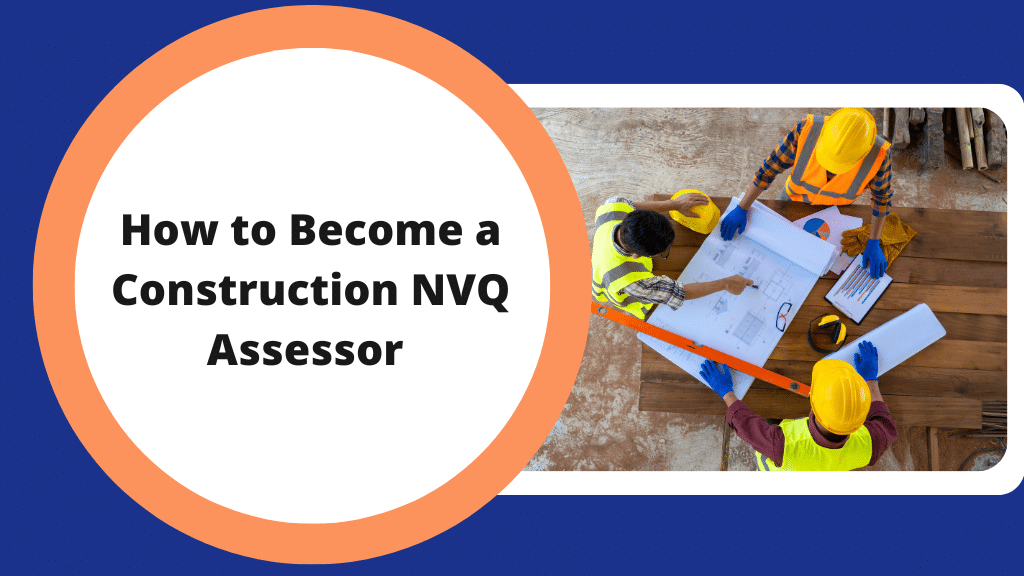May 6, 2025
How to Become a Construction NVQ Assessor

Thinking about moving into a more senior role in the construction industry? If you’ve built up years of hands-on experience, becoming a Construction NVQ assessor could be your next step.
It’s a practical way to pass on your skills, help others succeed, and continue working in the industry you know, but with greater flexibility and responsibility for construction education.
What does a Construction NVQ Assessor do?
A Construction NVQ assessor checks that people working towards their NVQ are meeting the national NVQ standards set by their awarding body. Each NVQ has a list of units, and each unit includes what a learner must know and be able to do on site. These cover both practical tasks (like fixing shuttering, laying bricks, or operating machinery) and knowledge (like health and safety, communication, or reading drawings).
Your role and responsibilities as an assessor might include:
- Watching someone do a job to judge if someone is safe, skilled, and ready to pass their qualification or competency
- Talking to them about why they’re doing and giving constructive feedback and advice
- Looking through their portfolio of evidence, photos, site paperwork and witness statements
- Making fair decisions and keeping good records
Why become a Construction Assessor?
Moving into assessing is a natural step for many experienced in the construction trades. It allows you to use your existing skills in a new way, while staying close to the tools, trades, and industry that you know well.
There are also clear benefits of taking an assessor qualification, from opening new doors to giving you more control over how you work. Many people become Construction NVQ assessors to:
- Reduce time on the tools without leaving the industry
- Take on a more senior or mentoring-style position
- Share their experience with new apprentices or trainees
- Open up new income opportunities in training centres or private providers
You might already spend time helping others on site by checking their work, showing them how to do things, or keeping an eye on safety, if so then you’re already doing the kind of work assessors do. Instead of helping out unofficially, you could get the proper qualification, be recognised for it, and be paid for doing it properly. It’s better to have the right training and confidence than to go through it on an ad-hoc basis.
Managers often look for assessors within their own teams. Supporting someone to gain the qualification helps build internal capacity, improves apprenticeship delivery, and strengthens overall quality standards.
How to Become a Construction Assessor
Get the Right Education and Training
To get started, you’ll need to complete an assessor qualification. There are two main options: the Level 3 Certificate in Assessing Vocational Achievement (CAVA) and the Level 3 Award in Assessing Competence in the Work Environment (ACWE). The right one for you depends on where and how you’ll be carrying out assessments. Both are nationally recognised and widely used in the construction and training sectors.
Build up Your Experience & Knowledge
You’ll need to be experienced in the trade you want to assess. That means having hands-on knowledge and ideally a relevant qualification yourself like an NVQ Level 2 or 3 in your area of work, like bricklaying, site carpentry, plumbing, electrics or plant operations.
You don’t need to know everything, but you do need to understand what good work looks like and be able to spot mistakes or unsafe practices. That real-world experience is what makes you a reliable assessor.
If you’ve been on the tools for a few years, worked as a supervisor, or trained others informally, you’re probably more prepared than you think. You already know how the job should be done, and the CAVA course just gives you the framework to assess it properly.
Work With Learners
To complete these courses, you’ll need to carry out some real assessments. That means working with at least two people in your trade area whom you can assess.
These could be colleagues, apprentices, junior team members, or trainees already on the construction site. You’ll assess them as they go about their normal tasks, like watching their work, asking questions, and reviewing the evidence of what they do.
This practical part of the course gives you the chance to put your new skills into action and build confidence. Your tutor will guide you through it, so you won’t be left to figure it out alone.
Which assessor qualification is right for you?
Quick comparison: CAVA vs ACWE
| Feature | CAVA | AACWE |
| Full title | Level 3 Certificate in Assessing Vocational Achievement | Level 3 Award in Assessing Competence in the Work Environment |
| Assessment setting | Workplace and learning | Workplace only |
| Units | 3 units | 2 units |
| Suitable for | Assessing NVQs, apprenticeships, and vocational courses in multiple settings | Assessing NVQs and apprenticeships in work only |
| Best for | Maximum flexibility across roles and sectors | Site-based roles or those assessing just in work environments |
Level 3 Certificate in Assessing Vocational Achievement (CAVA)
The CAVA course is the most thorough assessor qualification available. It qualifies you to assess in both the workplace and training centre or classroom settings.
What the Course Covers:
- Planning and carrying out assessments using a range of assessment methods
- Understanding assessment principles and how to apply them fairly
- Assessing learners on-site and in off-site or simulated environments
- Keeping accurate records and giving clear, supportive feedback
Best For:
- People with experience in a construction trade or site management
- Those who want to assess in more than one setting (e.g. on on-site and in a training centre or on a course)
- Anyone looking to support vocational qualifications or apprenticeships in a flexible role
Level 3 Award in Assessing Competence in the Work Environment (AACWE)
This course focuses entirely on workplace-based assessment. It qualifies you to assess learners on real construction sites or in any occupational setting where practical work is being carried out.
What the Course Covers:
- Assessing performance in the workplace using methods like observation, discussion, and portfolio review
- Making fair assessment decisions based on national standards
- Providing guidance and recording progress in real working environments
Best For:
- Construction professionals or supervisors carrying out assessments on live jobs
- Those who don’t need to assess in classroom or training centre settings
- Site managers supporting apprentices or trainees on site
Where can an assessor qualification take you next?
A recognised assessor qualification can lead to more assessment and quality assurance opportunities across the construction and training industries. Some people stay on site and take on more responsibility, while others move into roles with a training provider, college, or apprenticeship centre.
Working as an assessor helps you build skills in planning, communication, and giving structured feedback, all of which are useful if you’re aiming for site management or leadership roles.
If you’re already managing teams on a construction site, becoming an assessor can help you support staff development more effectively. You’ll be able to assess your team’s performance against national standards and keep training in-house, which can save time and improve quality.
These qualifications are also a good addition if you’re thinking about longer-term professional development. Many assessors go on to complete further training in internal quality assurance or construction site management, using their occupational experience to support others and shape the next generation of skilled workers.
Ready to become an NVQ Assessor?
Becoming a qualified assessor is straightforward once you know the steps. With the right course and support, you can build on the skills you already have and turn them into a recognised role that makes a real impact. You can complete the qualification in 12 months or less if you work through it steadily.
Book your place on an Assessor Course today, or contact us if you have any questions.
Next ›‹ Previous
Back to Blog








